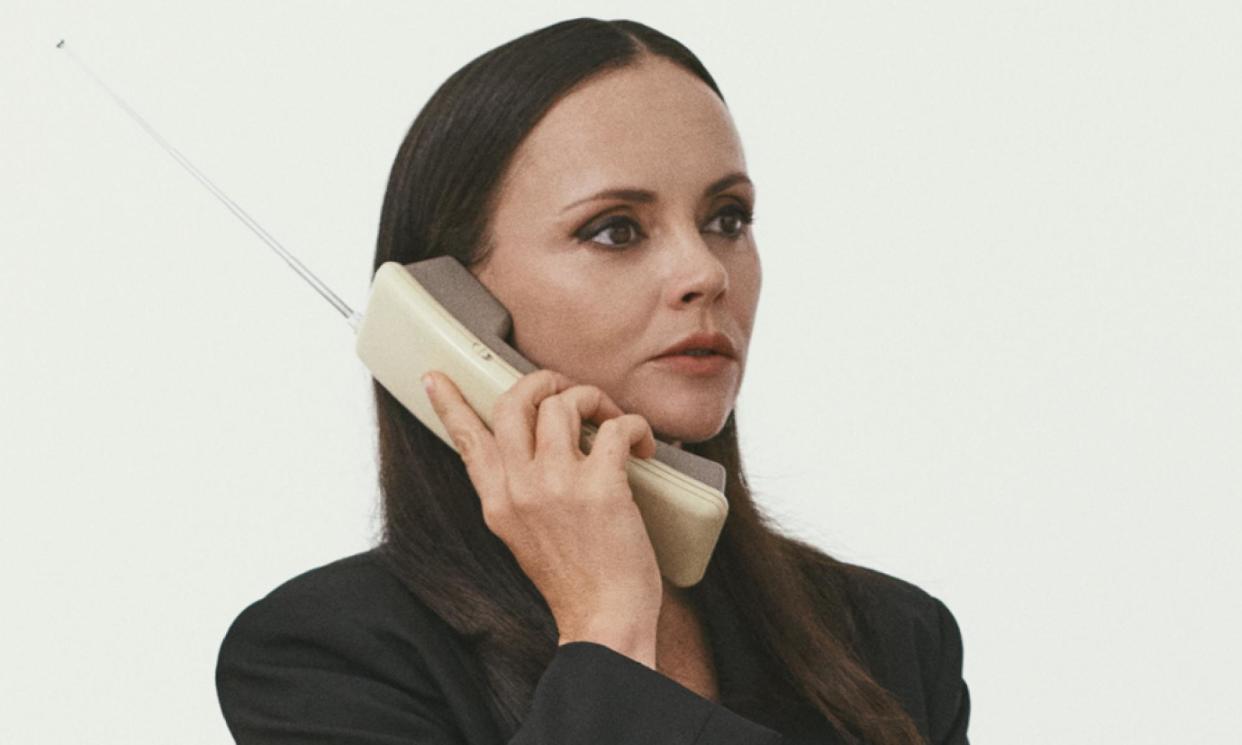Sell, sell, sell: corporate styling breaks out of the office and into fashion

For anyone who has lived the realities of bottom lines, deliverables, bad workplace coffee and terrible office parties, the corporate world may seem an odd place to look for creative inspiration. Yet offices are now circling back in surprising new ways. And fashion has embraced this by going for office dressing in a big way.
“Corpcore” is a fresh take on the usual 9-to-5 attire; executive style with sharper suits and more directional pinstripe is thriving.
For its latest ad, the Scandinavian brand Ganni has shot the actor Christina Ricci looking like failure is not an option, on an important call in a suit. Over at Prada, models sit in breakout zones or are on landlines shifting the paradigm in the Italian fashion house’s latest campaign.
At John Lewis, a “corpcore” edit includes “edgy officewear”, such as asymmetric waistcoats, studded Mary Jane flats and heeled loafers. At Whistles, tailoring is big for the next season, pinstripes add purpose to suiting and office silhouettes come in edgy leather. According to a spokesperson, waistcoats sales this year are 20 times higher than last year, while jackets and trousers are up 25%.
On the resale website Depop, “9 to thrive” was identified as a key category for summer and described as: “Leaning into the Office Siren era … fashion fans [are] cosplaying corporate in looks better suited for the bar not the boardroom.” Searches for blazers are up more than 30% since January; white shirts and kitten heels are up 67% and 66% respectively over the same period. Some of these clothes will be bought to actually wear to the office, but perhaps with more of an edge than in previous times, but many will never see so much as a photocopier.
Ties are in with women, young people and Miuccia Prada; suits are everywhere and smart office shoes, most ubiquitously loafers, now come with various twists and interesting sock styling – the footwear of weekend brunches as much as boardrooms.
Fashion has been here before – and surprisingly recently. In 2017, designers raked the proverbial spreadsheet of officewear and proposed a number of managerial styles in high-fashion iterations such as double-breasted suits, shirts with starched collars, ties and big boardroom bags. But what read as 80s retro then, appears now very of the moment.
This moment of hype and creativity inspired by the office goes well beyond fashion. Taylor Swift performed in a set that looked like an office, swivel chair included, during her Eras tour. A 2025 release date has just been announced for series two of the Emmy award-winning sci-fi and dark workplace thriller Severance. While Industry, the drama about life at the fictional Pierpoint & Co investment bank, is to return for its third series on BBC One on 1 October.
In the latest video from FKA Twigs, which was released last week, a grey office forms the backdrop for an offbeat take on a tale of the modern corporate culture. Keyboards are clacked, staplers bashed and landlines slammed. Choreography seems to play into ideas of a zombie workforce, teams contorting to meet their boss’s expectations until workersstart to pulsate around office chairs.
Laura Smith, the costume designer on the most recent series of Industry, thinks corpcore is having a moment because “office spaces are changing and the way we interact with them is changing”.
“Zoom calls are windows from workspace into home spaces meaning people have to navigate the optics of their dress in a way that is different now as there is potential for some bleed from public to private spaces,” she says. For Smith, the key piece that symbolises this is the gilet, or waistcoat. “The tech gilet and the funnel neck jumper have become a staple piece and the statement collar that reads well on a small screen,” she says.
Corporate styles of dressing may be popular outside the office world, according to Charlotte Broadbent, a specialist in corporate styling, because “corpcore is an incredibly easy style to replicate, with a sartorial aesthetic that makes you look expensive, successful, confident and really well put together”.
This is set against the backdrop of a corporate culture in flux. Idealising office culture is one thing when actual offices are largely empty but, as occupancy levels rise and workers trickle back, whether out of desire or diktat – Amazon this week mandated that its employees return to the office five days a week – it remains to be seen whether the office will remain creatively and sartorially inspiring.


